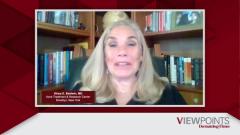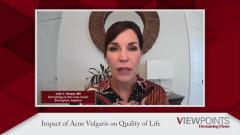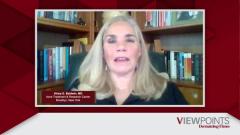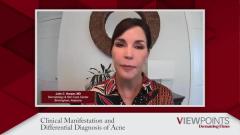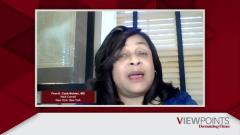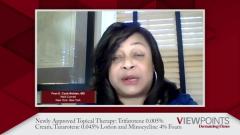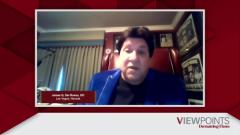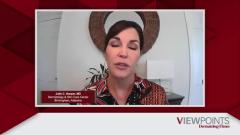
Prevalence of Acne in Adult Females
Julie C. Harper, MD, comments on the prevalence of acne in women and highlights differences from men.
Episodes in this series

Hilary E. Baldwin, MD: Julie, I remember that paper you and your team [at the Dermatology & Skin Care Center] wrote about the incidence of acne in adult females, where you said about it presents in about 50% of women in their 20s, 30% of women in their 30s, and 25% of women in their 40s. Adult females are particularly impacted by this. What do you see in your practice?
Julie C. Harper, MD: I see an awful lot of adolescent acne, and I definitely see people coming in younger. I see people coming in who are 8 or 9 years old who have acne, but that adult female population is for real. I don’t know if it’s because I’m an adult female dermatologist, but I see a lot of adult females who come in with acne. In the adult population, acne is skewed more toward the women.
I’ll look at my young men. Let’s say that we have somebody on isotretinoin, and it’s a young man who is 18 years old. I feel like I can look at him and say, “You’ve got a pretty good chance, once we get you clear, you’ve got a pretty good chance of staying clear.” If I see a young woman in that same situation, I think all of us on the call recognize that acne in adult women can linger. I don’t know if it’s the hormonal fluctuations, but I would look at that young woman and say, “You may have to do this again at some point, or you may be on some other treatment.”
Thank you for remembering that study. We worked hard on it. It was easy to remember. We didn’t mean for it to work out like that, but it was 1 out of 2 women recalled having acne in their 20s, 1 out of 3 women in their 30s, and 1 out of 4 women in their 40s. That’s a nice, easy way to remember that. You can use information that like in clinics because what do our adult females say to us when they come in? They say, “This is not fair. I should not have acne at this age.” You can at least say, “You’re not alone. You’re not alone. We have evidence that this is something that affects a lot of our adult females.”
Hilary E. Baldwin, MD: Yes, and we have to remember that some studies have shown that, if you have acne at age 25, then you’re likely to still have it at 45. We always call acne a chronic inflammatory disorder, but in adult females, it’s particularly chronic, isn’t it?
Julie C. Harper, MD: Yes.
Hilary E. Baldwin, MD: When you tell an adult female at age 25, “Don’t worry, it will go away at menopause,” they’re not exactly pleased by that information.
Have you seen what I like to call “last hurrah” acne? It happens for a woman who hasn’t had acne since her teenage years, and right at the perimenopausal period, all of a sudden, all heck breaks loose with inflammatory lesions.
Fran E. Cook-Bolden, MD: I definitely see that in my practice, Hilary. I see a large number of adult women, and I can tell you that I have personally gone through that. I won’t tell you where I am right now in that cycle, but I have definitely been through that and see it all the time.
Hilary E. Baldwin, MD: I don’t know what that means. What do you think it means, Julie? We always call acne in adult females hormonal acne, as if all acne isn’t hormonal. What does it mean when a 50-year-old who hasn’t had acne in the last 30 years all of a sudden gets pimples? Any idea?
Julie C. Harper, MD: No, but it means she’s not happy about that, I can tell you that. What you just said is right on: people want to label 1 type of acne as hormonal acne. We need to remember that all acne is hormonal. If it was all just about hormones, particularly circulating hormones, all men would have acne, and only some women would have it. It’s clearly not about circulating hormones, but all acne is hormonal. What we think is going on with women is that we have such fluctuations of hormones. It may be a change, and we’re certainly changing our levels of hormones around the perimenopausal area, but that’s a total guess. It’s a total guess. We don’t have this all figured out.
Fran E. Cook-Bolden, MD: Julie, you’re right on point. With myself, I would say that during that perimenopausal fluctuation when a lot of things are going on, that’s when that acne manifested itself. You’re right on point. When you’re getting that perimenopausal hormonal surge or hormonal fluctuation, that’s when we also see that increase in acne in older women.
Julie C. Harper, MD: Yes.
Hilary E. Baldwin, MD: I see it as like a teeter-totter. When we’re young, we have a lot of estrogen and just a little androgen. As estrogen slowly sinks down toward the horizon as we get older, that little amount of androgen that didn’t bother us before is all of a sudden driving the ship, so to speak.
Newsletter
Like what you’re reading? Subscribe to Dermatology Times for weekly updates on therapies, innovations, and real-world practice tips.

